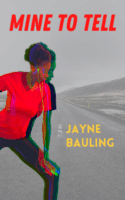“I don’t get it,” I tell Auntie Hlomisa and Gogo when they come home. “I explained all the usual stuff to him – about how my viral load is undetectable, but even so, I still said that I’d never take risks. Good hygiene and diet, taking my meds, and … um, safe sex, when the time arrives.”
I hesitate before saying that last bit, because Gogo gets a bit uptight about sex and young people. Auntie is more relaxed.
They knew something was wrong as soon as they saw me. I have few secrets from them, so I told them about Mahlatse.
“He’s a fool,” Auntie says, making a sweeping-away movement with her hands. “Forget him.”
“I liked him.” My voice wobbles, but then anger rises up again. “You know that I decided I’d tell people who might have a right to know, including boyfriends? Like my bosses at Nifty Nails and Oom Leon? And they were cool with it. But after Mahlatse, I feel like I never want to be honest with anyone, ever again … And talking of Oom Leon, how does Mahlatse think I manage to do athletics and keep winning, if I’m ‘diseased’, as he called it?”
Oom Leon is my athletics coach, this old dude who’s put together a squad of athletes aged over 18, here in Phalaborwa.
“Have you got training tonight?” Gogo asks, and I know she’s trying to distract me from thinking about Mahlatse.
“Yes.” A little thrill of excitement lifts my mood. “Getting into training for the big Potchefstroom championships next season, and warming up for smaller competitions here in Limpopo, now that things are opening up. Oom Leon is looking at this key track meeting in Polokwane next month.”
“Will it be safe?” Gogo is frowning.
“He won’t let us go unless he believes the organisers have proper Covid protocols in place.” I smile for the first time since before telling Mahlatse the truth about myself. “It’s so funny, keeping social distancing at training. Our voices have all got louder, keeping apart from each other and talking through masks.”
“It’s a shame Mahlatse is part of your athletics group and you still have to see him,” Auntie says. She gets up from the couch where, not so long ago, I thought Mahlatse and I were at the start of something romantic.
“I think I’ll just ignore him,” I decide. “At least Dzanga will be happy. She’s never liked me, and I’m sure it’s got worse since Mahlatse started paying attention to me. I don’t think she’d have been too pleased if I’d agreed to go to her party with him.”
“Or maybe she sees you as a rival over 800 metres,” Auntie laughs.
“Could be. I think it’s good that our times are so close, because we sort of push each other, but I don’t think she feels the same.” I check the time on my phone. “I must get changed.”
I’m so used to seeing messages from Mahlatse every time I look at my phone. It feels wrong not to see anything now, but I need to teach myself not to mind. He’s not worth my regrets.
I glance back at my grandmother and aunt before leaving the room. I’m so lucky to have them in my life, these two women who brought me up alongside Auntie’s children, my cousins, both away working in Tzaneen and Polokwane these days.
Mahlatse has let me down, but I know they never will. And that gives me the strength to face him again.
Tell us: People like Ritlatla, living with HIV, often have difficult decisions to make. Who – if anyone – should they tell about their status? What is your opinion on being open about a positive HIV status?

